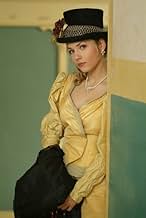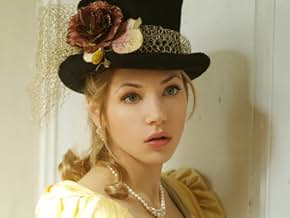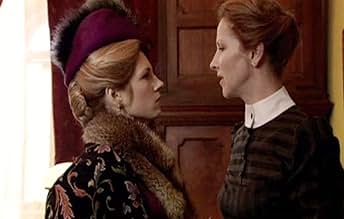AVALIAÇÃO DA IMDb
6,4/10
5,1 mil
SUA AVALIAÇÃO
O médico vienense Josef Breuer se reúne com o filósofo Friedrich Nietzsche para ajudá-lo a lidar com seu desespero.O médico vienense Josef Breuer se reúne com o filósofo Friedrich Nietzsche para ajudá-lo a lidar com seu desespero.O médico vienense Josef Breuer se reúne com o filósofo Friedrich Nietzsche para ajudá-lo a lidar com seu desespero.
- Direção
- Roteiristas
- Artistas
Michal Yannai
- Bertha
- (as Michal Yanai)
Ayana Haviv
- Singer - 'Hymnus an den leben'
- (não creditado)
- Direção
- Roteiristas
- Elenco e equipe completos
- Produção, bilheteria e muito mais no IMDbPro
Avaliações em destaque
I just wonder how many people are going to be tuned in to seeking out and sitting through a film all about psychoanalysis, detailing very briefly the more desperate incidences in the lives of some of the most brilliant minds ever to have graced Earth. My heart hopes as many as possible but my mind tells me not many will bother, and given this that's quite a shame. The film is a concentrated study on illness and the effects of illness but the said sickness is more affiliated to love or problems of a psychological kind. The events, no matter how fabricated over history, are still compelling and the film just about works as a drama or a study of an individual's actions given their emotions that run on a dizzying high.
The film follows Josef Breuer (Cross) and Friedrich Nietzsche (Assante) who meet and attempt to help one another. The setting is 1870s Vienna in Austria at a time when some of the most brilliant minds ever would congregate to pioneer the study of psychoanalysis; love as an illness and what makes us who we are through these events. On this occasion, Nietzsche has fallen for a woman and she is Lou Salome (Winnick). This acts as the catalyst for him to seek help from Breuer, an experienced and responsible doctor who has battled his own demons in the past to do with one of his parents' early death. Nietzsche at first seeks to run from his problem, thinking escaping to Switzerland will compensate for the pain following the rejection of marriage.
But this isn't the end of it. There is no surprise that a film dealing with psychoanalysis, and containing Sigmund Freud, has a few mind games up its sleeve. The film is uncannily seductive in its general atmosphere and quite humbling on other occasions. Breuer is good friends with Sigmund Freud himself (Elman) and they both seem overly concerned with Nietzsche which propels them into at least pretending one of them needs help from Nietzsche in return.
In order to achieve this, Breuer assumes the stance that he himself is falling in love with one of his patients and requests the help from Nietzsche in return he help him get over his break up. There's a lot of psychology going on here and a lot of scenes and content that deals with mental health. Nietzsche undergoes perhaps the more interesting study of the characters because his is the more dramatic, slipping into despair and depression after initially trying to combat the break up with 'remedy' from prostitution and, like I mentioned, fleeing entirely.
The point When Nietzsche Wept has going for it the whole time is the age of these primary characters. This is not a (another?) mere look at young people in contemporary America or wherever trying to get over relationships or trying to instigate one so that they may have sex, this is a thoughtful and interesting look at people of an older age dealing with real issues that at the time, remained as scary and as ambiguous as you could possibly imagine. The frightening thing that should remain at the back of the viewer's mind is 'what if you were very ill, but you did not know of the illness you have?' Twinned with this, what if you did not know of the treatment and the pain or whatever would simply not disappear? Nowadays, we're all fine with our doctors and so forth and our teen sex comedies that act as an escapist or humoured look at coming of age or love or sex or whatever but When Nietzsche Wept is a pit stop; a look back at times past.
The film is a grand display of surrealism, dreams often beginning naturally enough before descending into chaos. We the audience ask the question of what is going on and just when it seems the impossible or the downright obscure is about to happen, our questions are answered. The film is a study into the great minds that pioneered certain theory but it's a look at their own struggles; their own struggles that helped shape an understanding in the first place. The film is a study of a delicate mentality as expressed by those of a brilliant natural intelligence.
Whether it's the bizarre manner in which Breuer refers to Freud as 'Siggy' or the odd scenes to do with diegetic classical music complete with orchestra that Nietzsche himself composes to the bemusement of those around him, the film remains an interesting look at a subject that is being dealt with head on rather than in a metaphorical or dramatic way, much like Hitchcock and Lynch have done in the past. But don't be fooled for it isn't a documentary and it does retain a fair amount of drama throughout. It may not be as good a metaphorical study but it remains interesting and thought-provoking.
The film follows Josef Breuer (Cross) and Friedrich Nietzsche (Assante) who meet and attempt to help one another. The setting is 1870s Vienna in Austria at a time when some of the most brilliant minds ever would congregate to pioneer the study of psychoanalysis; love as an illness and what makes us who we are through these events. On this occasion, Nietzsche has fallen for a woman and she is Lou Salome (Winnick). This acts as the catalyst for him to seek help from Breuer, an experienced and responsible doctor who has battled his own demons in the past to do with one of his parents' early death. Nietzsche at first seeks to run from his problem, thinking escaping to Switzerland will compensate for the pain following the rejection of marriage.
But this isn't the end of it. There is no surprise that a film dealing with psychoanalysis, and containing Sigmund Freud, has a few mind games up its sleeve. The film is uncannily seductive in its general atmosphere and quite humbling on other occasions. Breuer is good friends with Sigmund Freud himself (Elman) and they both seem overly concerned with Nietzsche which propels them into at least pretending one of them needs help from Nietzsche in return.
In order to achieve this, Breuer assumes the stance that he himself is falling in love with one of his patients and requests the help from Nietzsche in return he help him get over his break up. There's a lot of psychology going on here and a lot of scenes and content that deals with mental health. Nietzsche undergoes perhaps the more interesting study of the characters because his is the more dramatic, slipping into despair and depression after initially trying to combat the break up with 'remedy' from prostitution and, like I mentioned, fleeing entirely.
The point When Nietzsche Wept has going for it the whole time is the age of these primary characters. This is not a (another?) mere look at young people in contemporary America or wherever trying to get over relationships or trying to instigate one so that they may have sex, this is a thoughtful and interesting look at people of an older age dealing with real issues that at the time, remained as scary and as ambiguous as you could possibly imagine. The frightening thing that should remain at the back of the viewer's mind is 'what if you were very ill, but you did not know of the illness you have?' Twinned with this, what if you did not know of the treatment and the pain or whatever would simply not disappear? Nowadays, we're all fine with our doctors and so forth and our teen sex comedies that act as an escapist or humoured look at coming of age or love or sex or whatever but When Nietzsche Wept is a pit stop; a look back at times past.
The film is a grand display of surrealism, dreams often beginning naturally enough before descending into chaos. We the audience ask the question of what is going on and just when it seems the impossible or the downright obscure is about to happen, our questions are answered. The film is a study into the great minds that pioneered certain theory but it's a look at their own struggles; their own struggles that helped shape an understanding in the first place. The film is a study of a delicate mentality as expressed by those of a brilliant natural intelligence.
Whether it's the bizarre manner in which Breuer refers to Freud as 'Siggy' or the odd scenes to do with diegetic classical music complete with orchestra that Nietzsche himself composes to the bemusement of those around him, the film remains an interesting look at a subject that is being dealt with head on rather than in a metaphorical or dramatic way, much like Hitchcock and Lynch have done in the past. But don't be fooled for it isn't a documentary and it does retain a fair amount of drama throughout. It may not be as good a metaphorical study but it remains interesting and thought-provoking.
Its not a tremendous film, a must see, of a picture at his own, When Nitszche Wept is very good driven style of fan fiction, that manage to get us near to a lot of Niche, and Freud, concepts -but in reality is only near, because as lots of book-film adaptations, it takes a to much of the director's point of view-, it gets it right in some moments and is not a waste of time at all, but it suffers from his flaws, the nature of art, is specific to each category it belongs, this is most like and homage, and want us to remember very important things, and don't care about being very technical with the acting, the passing, or the writing itself, it's made great with the cameos that it have, and the good vibe the producers have toward those beautiful mind that they were, but maybe fails, to stand alone as film,
Fine production values, a dry sense of humor throughout, literate script, decent casting (Assante transcends his usual "heroics" and plays a crumbling soul nicely and Cross is always workmanlike and solid), and, slyly, the film (as the book did) finally gives Nietzsche credit for inventing modern psychoanalysis (since Freud, et al, in the field stole from his works outrageously and lavishly, without assigning him the proper credit for his startlingly original insights into the world-historical human, all too human capacity for self-deception).
A tough work for an adaptation, but this movie succeeds where something like "Freud" dismally collapsed into timid clichés.
Nietzsche would have gotten many a devilish laugh out of this work's visual craftiness.
And appreciated being treated, not as a cartoon "Overman" idol, but a struggling, flawed, tragic-comically-profound human.
"Ecce Homo", his anti-"autobiography" warned those who followed not to take him too seriously.
If this film stimulates a few people to pick up his "Joyful Wisdom" (La Gaya Scienza) or "Dawn", it will have made its honorable point.
Yalom was, in essence, giving Nietszche a posthumous brother's embrace for his loneliness and struggle and brilliance and scorn and lack of recognition while he lived.
This movie does the same.
To a guy, who, friendless and abandoned and ignored through much of his writing life, still affirmed the Universe and humanity in the words:
"Man would rather have the Void for a purpose than be void of purpose." -F.N.
Worth a viewing.
A tough work for an adaptation, but this movie succeeds where something like "Freud" dismally collapsed into timid clichés.
Nietzsche would have gotten many a devilish laugh out of this work's visual craftiness.
And appreciated being treated, not as a cartoon "Overman" idol, but a struggling, flawed, tragic-comically-profound human.
"Ecce Homo", his anti-"autobiography" warned those who followed not to take him too seriously.
If this film stimulates a few people to pick up his "Joyful Wisdom" (La Gaya Scienza) or "Dawn", it will have made its honorable point.
Yalom was, in essence, giving Nietszche a posthumous brother's embrace for his loneliness and struggle and brilliance and scorn and lack of recognition while he lived.
This movie does the same.
To a guy, who, friendless and abandoned and ignored through much of his writing life, still affirmed the Universe and humanity in the words:
"Man would rather have the Void for a purpose than be void of purpose." -F.N.
Worth a viewing.
It is not a great movie. It is not a masterpiece. It may be boring and fake at first sight. But... A film about a Nietsche. Not very different of the philosopher. The character is seductive, power and Armand Assante is brilliant in his skin. The atmosphere is carefully recreated. Colors, gestures, social conceptions are pieces of a small visual museum. So, the movie is a good introduction to understand the shadows of XIX century end. For look the existence with the eyes of men of a special way to discover the essence of to be. Certainly, the film gives only sketches of great people. Lou Salome is more than strange muse of a philosopher and Nietsche is prophet in another sense than the character. No bad, no extraordinary. Only good subject of reflection. And introduction to cultural scene.
Occasionally ridiculous in the dream/hypnotherapy sequences and borderline slapstick bio-pic in others, 'When Nietzsche Wept' somehow remained compelling enough to have me sit right through to the end despite an unconvincing father of psychoanalysis still having to show ID for the age of consent (Jamie Elman as Freud) and Katheryn Winnick as cigar chomping proto ladette femme fatale Lou Salome.
There is very little exploration of Nietzche's philosophical ideas here but instead his incredibly prescient innovation in the realm of psychology as seen through the prism of the incipient discipline of psychoanalysis in Vienna circa 1882. Ben Cross is brilliant as the likeable albeit conveniently repressed and commensurately flawed Dr Breuer, adrift in a loveless marriage, a materially successful career but bereft of passion, danger or excitement in his unfailingly dutiful life. Things start to resemble the relationship between poets Verlaine and Rimbaud at this point (see Agnieszka Holland's 'Total Eclipse' from 1995) with Nietzsche advising Breuer to throw off the shackles of his unthinking conformity and embrace his freedom. Nietzsche certainly never did this, having died a virgin (despite being portrayed in a whorehouse) and was an invalid for most of his adult life on a pension paid for by academia. Whether Breuer actually makes this existential plunge is open to debate as the Director would have us believe this whole extended sequence was under Freudian hypnosis. Armand Assante was assigned one of the most thankless casting gigs of all time by being asked to portray the most innovative and radical thinker humankind has produced in over a thousand years. My gut feeling, on a personal level is that when Friedrich Nietzsche entered a room, that room got larger i.e. Assante exudes a cynical but palpable personality consistent with what he sees as his remit but I suspect Nietzsche was silent, inscrutable and withdrawn which is clearly anathema to cinematic portrayals. The movie is based on Irvin D. Yalom's 1992 novel which I haven't read but is purportedly concerned with the idea of limerence which as an idea is about as robust as 'gender' in 2023.
There is very little exploration of Nietzche's philosophical ideas here but instead his incredibly prescient innovation in the realm of psychology as seen through the prism of the incipient discipline of psychoanalysis in Vienna circa 1882. Ben Cross is brilliant as the likeable albeit conveniently repressed and commensurately flawed Dr Breuer, adrift in a loveless marriage, a materially successful career but bereft of passion, danger or excitement in his unfailingly dutiful life. Things start to resemble the relationship between poets Verlaine and Rimbaud at this point (see Agnieszka Holland's 'Total Eclipse' from 1995) with Nietzsche advising Breuer to throw off the shackles of his unthinking conformity and embrace his freedom. Nietzsche certainly never did this, having died a virgin (despite being portrayed in a whorehouse) and was an invalid for most of his adult life on a pension paid for by academia. Whether Breuer actually makes this existential plunge is open to debate as the Director would have us believe this whole extended sequence was under Freudian hypnosis. Armand Assante was assigned one of the most thankless casting gigs of all time by being asked to portray the most innovative and radical thinker humankind has produced in over a thousand years. My gut feeling, on a personal level is that when Friedrich Nietzsche entered a room, that room got larger i.e. Assante exudes a cynical but palpable personality consistent with what he sees as his remit but I suspect Nietzsche was silent, inscrutable and withdrawn which is clearly anathema to cinematic portrayals. The movie is based on Irvin D. Yalom's 1992 novel which I haven't read but is purportedly concerned with the idea of limerence which as an idea is about as robust as 'gender' in 2023.
Você sabia?
- Citações
Josef Breuer: How could I have given up everything?
Nietzsche: You'd given up everything long before you met me.
Josef Breuer: Yes, but now I have nothing.
Nietzsche: Nothing *is* everything. In order to grow strong, you must first sink your roots deep into nothingness. Learn to face your loneliest loneliness.
Principais escolhas
Faça login para avaliar e ver a lista de recomendações personalizadas
- How long is When Nietzsche Wept?Fornecido pela Alexa
Detalhes
- Data de lançamento
- País de origem
- Centrais de atendimento oficiais
- Idioma
- Também conhecido como
- When Nietzsche Wept
- Locações de filme
- Empresa de produção
- Consulte mais créditos da empresa na IMDbPro
- Tempo de duração1 hora 45 minutos
- Cor
- Mixagem de som
- Proporção
- 1.85 : 1
Contribua para esta página
Sugerir uma alteração ou adicionar conteúdo ausente

Principal brecha
What is the Spanish language plot outline for Quando Nietzsche Chorou (2007)?
Responda



























